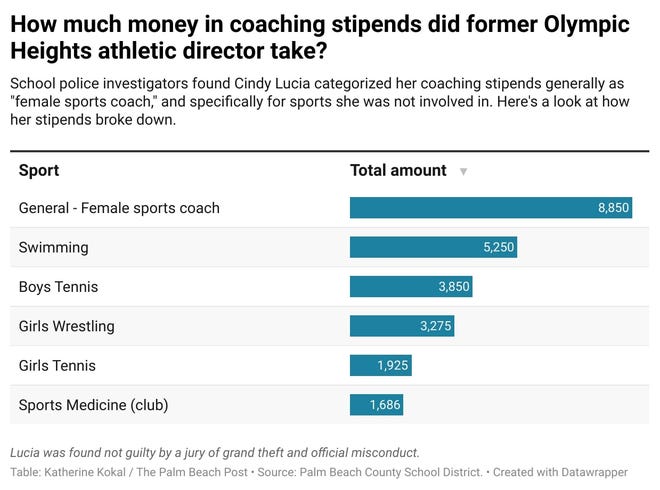
Schools pay $70M extra for coaching, higher degrees. Some records, approvals are missing.
The Palm Beach Post | By Katherine Kokal | February 27, 2023
The school board called for an audit of stipends after it voted to fire a former Olympic Heights employee accused of taking $24K she didn’t deserve.
Key Points
- Auditors found that staff can assign supplements with no supervisor approval.
- 15 of the 19 sampled schools didn’t have any records of who principals approved for supplemental pay.
- The school district spends $70 million on supplemental pay each year and $85 million on retention bonuses.
Palm Beach County’s school district pays more than $70 million each year in salary supplements to teachers and staff members for things including coaching athletics or holding advanced degrees, but a review of the system that tracks some of those payments found a lack of records of who approved them and a large number of people with districtwide access to the payroll.
A preliminary review by the district’s audit committee also discovered people who were overpaid by thousands of dollars and schools that kept no records of which employees were approved for supplemental pay, triggering calls for reform.
Heather Frederick, the district’s chief financial officer and a former auditor, said her departments are overhauling the existing system of keeping track of supplements on paper at individual schools. She hopes to have the new system up and running by the start of the 2023-24 school year.
“The majority of the $70 million (in supplements) is either approved by the principal or at the district level. It’s only the annual and seasonal supplements that are not going through the normal process,” she said of athletic supplements. “It doesn’t mean the principal wasn’t approving it. It’s only that there wasn’t documentation maintained of the evidence.”
An audit of $17 million in advanced degree supplements and more than $3.4 million in athletic stipends found the following:
- 139 employees who coached sports without having the required certifications
- $14,800 total paid to three employees who didn’t qualify for advanced degree supplements
- More than 100 employees who have districtwide access to supplement payroll records
- 79% of the schools sampled didn’t keep records of principals’ approvals of supplements
Justin Katz, president of the Classroom Teachers Association, said the audit demonstrates the need for “much stricter oversight and guidelines” on supplements and where the payments go.
The school district in 2022 paid $70 million total to team leaders, department chairs, teachers who hold advanced degrees, employees working in the Glades region, club sponsors and athletic coaches. The audit appeared to dig into advanced degree stipends and the annual and seasonal supplements — specifically athletic stipends.
On top of that, the district paid $85 million more in supplements to retain teachers, money approved by voters through a 2018 property tax referendum that financed annual bonuses of $1,000, $5,000 or $10,000, depending on their years of experience.
The audit comes on the heels of the school board’s firing of a former Olympic Heights athletic director accused of pocketing more than $24,000 in supplements.
Cindy Lucia was arrested in the summer of 2021 after school police alleged she collected athletic stipends for sports that she wasn’t coaching, grounds work she didn’t complete and managing teams that Olympic Heights didn’t even have.
Investigators said that Lucia paid herself $24,836 between fall 2016 and fall 2019 when she was the school’s athletic director and softball coach. She was fired by the school board in September.
The board’s decision to fire her came less than a week after a Palm Beach County jury found her not guilty of grand theft and official misconduct. Lucia has appealed her firing and is awaiting arbitration in April.
“This practice is rampant throughout the school (district). Coaches got three to four supplements for things they didn’t do,” said Michael Salnick, Lucia’s defense attorney. “Coaches told us, ‘It’s just the way things are in the district.’ “
Palm Beach County coaches get $3.4 million in bonuses each year
In 2021, the district paid a total of $3.4 million in athletic supplements to 882 employees for coaching or helping with sports teams.
The audit reviewed those 882 cases and found that three people coached teams without the required teaching and coaching certifications and 138 people coached athletic activities with expired CPR, automated external defibrillator (AED) and/or first aid certificates, which are required to be active throughout the season.
But the audit appeared to stop short of addressing athletic stipends collected by employees who were not involved in the sports they said they were — the accusations against Lucia.
Between 2016 and 2019, she received $3,275 each year for being the head coach of the girls’ JV wrestling team and $1,925 for being the assistant coach to the boys’ tennis team, even though she was not a coach for either sport, according to an investigation by the school district inspector general. She was also paid a yearly athletic trainer supplement of $562 even though she was not one.
Lucia was also compensated for coaching sports that didn’t exist, including $2,500 for coaching a “JV girls’ swimming team,” according to the school IG.
But Salnick said that interviews he did with the Olympic Heights staff revealed that it’s a relatively common practice for school staff members to get a coaching supplement for helping a team but not being its coach. The district’s policy for sports and clubs supplements does not support that practice. It only outlines the requirements for coaches to receive the supplements.
Frank D’Annunzio, an assistant principal at Olympic Heights, said that staff members who mark a field for a game or help student-athletes study can be compensated using a coaching supplement, which the athletic director approves. But investigators said Lucia’s supplements went beyond that. They found that Lucia was getting the coaching supplements instead of the coaches who were putting in the work.
Still, her attorney said that Lucia was not the only person getting supplements to which she wasn’t entitled.
“We found some 15 other school board employees who, for example, received sixth-period teaching supplements and didn’t teach any classes, people relieved from their positions only to receive full supplements, employees receiving coaching supplements for other duties or gender equity supplements as a coach but not coaching,” Salnick wrote in a letter to the school board prior to Lucia’s firing.
“Essentially, many people were paid from different budgets yet Ms. Lucia is called a thief for doing so,” he wrote.
Three school board members voted against her termination, including Karen Brill. Now, Brill said she supports the audit committee’s recommendations to bring the supplemental pay system fully online, and that she was stunned by the issues with district recordkeeping.
“I felt that people may be gaming the system, but it was surprising to me,” she said.

Teachers, district staff with master’s degrees get $17 million in bonuses
As of May, 5,802 district employees were receiving advanced degree supplements totaling $17 million for holding degrees beyond those required for their jobs.
The audit committee chose 60 employees who got the supplements to review in depth and found that three together were overpaid $14,800. In two of those cases, the employees’ supplements weren’t adjusted when they changed jobs, even though those changes took place in 2014 and 2017.
Fredericks said there were “not a significant number” of overpayments to employees, and those who were being overpaid have been placed on repayment plans.
In addition, the audit found that the district didn’t always require proof of a college degree to pay $244,000 in advanced degree supplements to 185 school police officers. Instead, the chief of police could attest to officers’ education levels instead of collecting college transcripts.
The audit committee found that three school police officers did not have the required college transcripts.
District payroll software needs improvement, audit committee says
Finally, the audit committee found that the district needs to improve how it reports and tracks supplemental pay. Three major things stood out:
- 15 of 19 sampled schools didn’t have any records of who principals approved for supplemental pay
- 104 employees had districtwide access to the supplemental payroll information in PeopleSoft, the district’s payroll system. The audit committee called that number of users “excessive.” Following the audit, the district staff removed access for 45 people and limited the districtwide access to offices that handle human resources and payroll.
- The PeopleSoft system does not require a supervisor’s approval for assigning supplements to employees.





